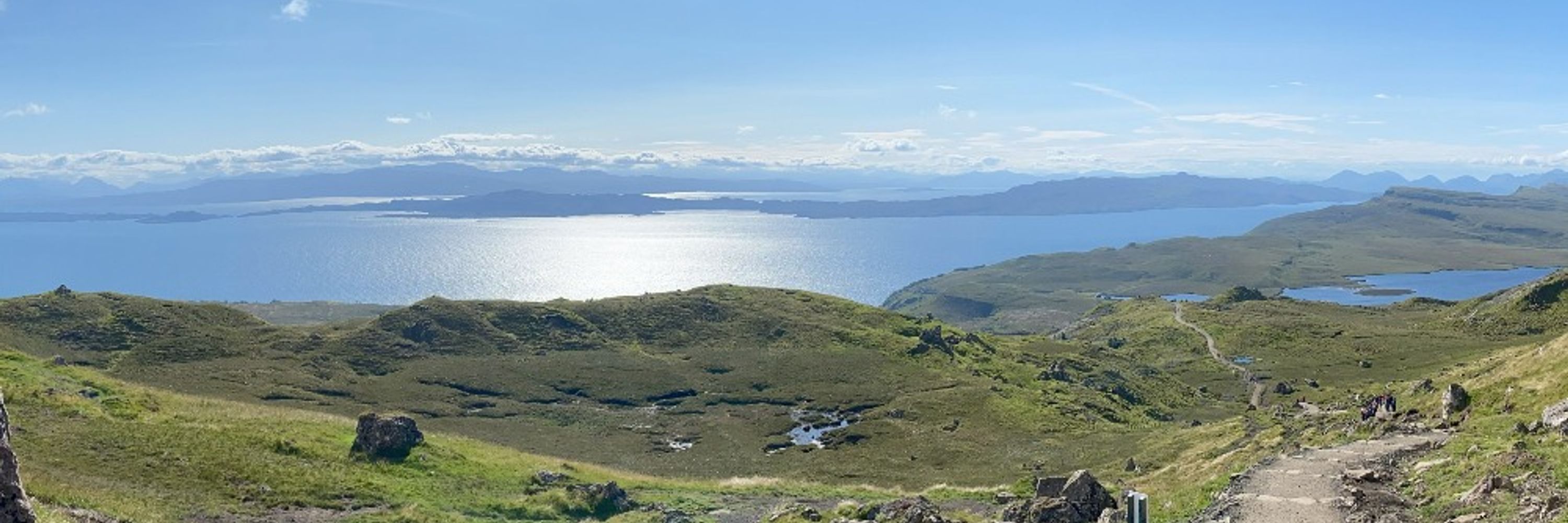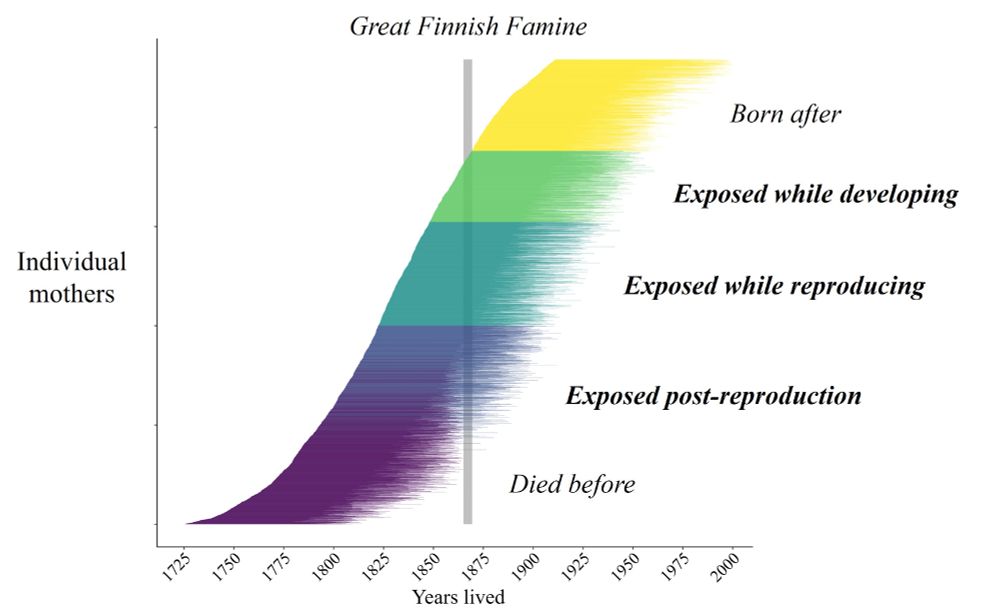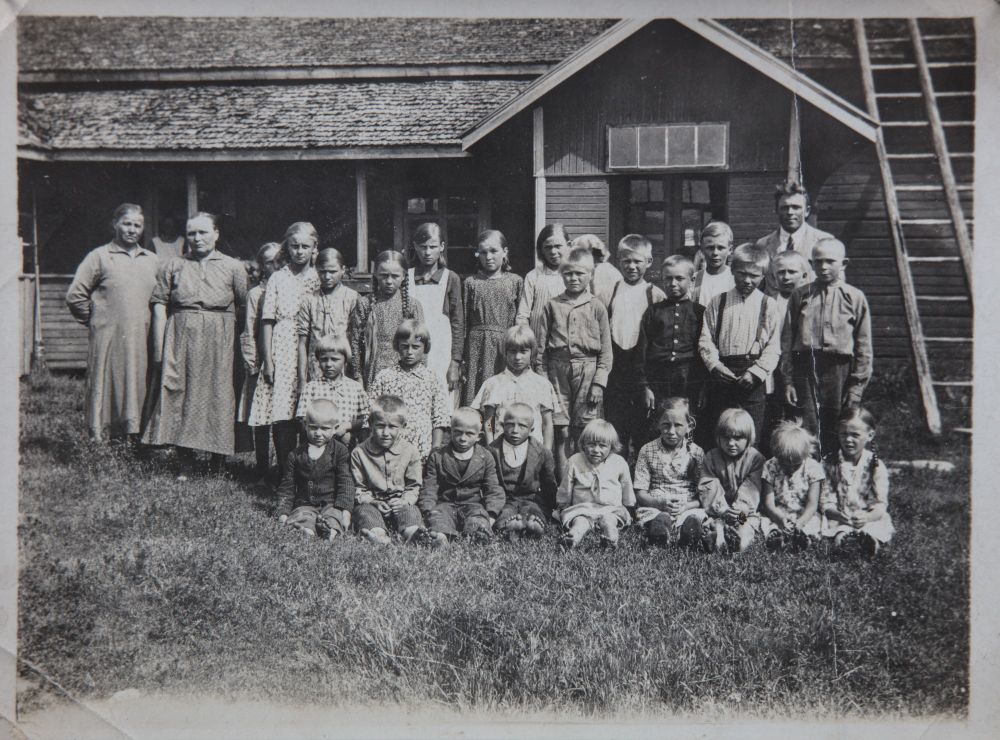
Euan Angus Young
@euantheyoung.bsky.social
Excitable PhD student interested in how an evolutionary perspective can inform our understanding of human health and disease | University of Groningen | he/him
9/ These differences then disappeared again after the famine, probably because of the improvements in healthcare and reductions in family size in 20th-century Finland.

November 10, 2025 at 10:57 AM
9/ These differences then disappeared again after the famine, probably because of the improvements in healthcare and reductions in family size in 20th-century Finland.
8/ Mothers exposed during other life stages did not show these costs. This suggests that environmental conditions can influence whether mothers suffer reduced lifespans when having more children, but it is the conditions experienced while actively raising children that are most important.

November 10, 2025 at 10:57 AM
8/ Mothers exposed during other life stages did not show these costs. This suggests that environmental conditions can influence whether mothers suffer reduced lifespans when having more children, but it is the conditions experienced while actively raising children that are most important.
7/ …mothers reproducing during the famine had shorter lifespans if they had more children – around half a year per child!

November 10, 2025 at 10:57 AM
7/ …mothers reproducing during the famine had shorter lifespans if they had more children – around half a year per child!
6/ Before the famine, mothers having more children did not have shorter lifespans, showing no support for the trade-off between reproduction and survival. However…

November 10, 2025 at 10:57 AM
6/ Before the famine, mothers having more children did not have shorter lifespans, showing no support for the trade-off between reproduction and survival. However…
5/ To test this, we leveraged a famine event during our historical data, which span 250 years across thousands of Finns. We examined whether mothers having more children lived shorter lives, comparing across mothers not exposed to the Great Finnish Famine, or exposed during different life stages.

November 10, 2025 at 10:57 AM
5/ To test this, we leveraged a famine event during our historical data, which span 250 years across thousands of Finns. We examined whether mothers having more children lived shorter lives, comparing across mothers not exposed to the Great Finnish Famine, or exposed during different life stages.
4/ Part of an explanation might be that healthy mothers can have more children without paying for these lifespan costs. For example, previous work suggested that the trade-off becomes more visible in poorer socioeconomic conditions.
...but what about the environment?
...but what about the environment?

November 10, 2025 at 10:57 AM
4/ Part of an explanation might be that healthy mothers can have more children without paying for these lifespan costs. For example, previous work suggested that the trade-off becomes more visible in poorer socioeconomic conditions.
...but what about the environment?
...but what about the environment?
3/ It follows that women having more children might live shorter lives. Researchers have been looking at this since the early 20th century(!), but results are inconsistent at best. Some studies do show the tradeoff, but others find no relationship or even a positive association.
So what's going on?
So what's going on?

November 10, 2025 at 10:57 AM
3/ It follows that women having more children might live shorter lives. Researchers have been looking at this since the early 20th century(!), but results are inconsistent at best. Some studies do show the tradeoff, but others find no relationship or even a positive association.
So what's going on?
So what's going on?
2/ Why we age and why some of us age faster than others are HUGE questions that attract a diversity of researchers. One idea – from evolutionary biology – is that there is a trade-off between reproduction and survival (i.e., the disposable soma hypothesis).

November 10, 2025 at 10:57 AM
2/ Why we age and why some of us age faster than others are HUGE questions that attract a diversity of researchers. One idea – from evolutionary biology – is that there is a trade-off between reproduction and survival (i.e., the disposable soma hypothesis).
1/13 New paper out! www.science.org/doi/10.1126/...
Historical records across thousands of women showed that mothers with more children had shorter lifespans during a famine, fitting an evolutionary explanation for why we age
@hannahdugdale.bsky.social
@lummaalab.bsky.social
@erikpostma.bsky.social
Historical records across thousands of women showed that mothers with more children had shorter lifespans during a famine, fitting an evolutionary explanation for why we age
@hannahdugdale.bsky.social
@lummaalab.bsky.social
@erikpostma.bsky.social

November 10, 2025 at 10:57 AM
1/13 New paper out! www.science.org/doi/10.1126/...
Historical records across thousands of women showed that mothers with more children had shorter lifespans during a famine, fitting an evolutionary explanation for why we age
@hannahdugdale.bsky.social
@lummaalab.bsky.social
@erikpostma.bsky.social
Historical records across thousands of women showed that mothers with more children had shorter lifespans during a famine, fitting an evolutionary explanation for why we age
@hannahdugdale.bsky.social
@lummaalab.bsky.social
@erikpostma.bsky.social
9/
These differences then disappeared again after the famine, probably because of the improvements in healthcare and reductions in family size in 20th-century Finland.
These differences then disappeared again after the famine, probably because of the improvements in healthcare and reductions in family size in 20th-century Finland.

February 13, 2025 at 3:46 PM
9/
These differences then disappeared again after the famine, probably because of the improvements in healthcare and reductions in family size in 20th-century Finland.
These differences then disappeared again after the famine, probably because of the improvements in healthcare and reductions in family size in 20th-century Finland.
8/
Mothers exposed during other life stages did not show these costs. This suggests that environmental conditions can influence whether mothers suffer reduced lifespans when having more children, but it is the conditions experienced while actively raising children that are most important.
Mothers exposed during other life stages did not show these costs. This suggests that environmental conditions can influence whether mothers suffer reduced lifespans when having more children, but it is the conditions experienced while actively raising children that are most important.

February 13, 2025 at 3:46 PM
8/
Mothers exposed during other life stages did not show these costs. This suggests that environmental conditions can influence whether mothers suffer reduced lifespans when having more children, but it is the conditions experienced while actively raising children that are most important.
Mothers exposed during other life stages did not show these costs. This suggests that environmental conditions can influence whether mothers suffer reduced lifespans when having more children, but it is the conditions experienced while actively raising children that are most important.
7/
…mothers reproducing during the famine had shorter lifespans if they had more children – around half a year per child!
…mothers reproducing during the famine had shorter lifespans if they had more children – around half a year per child!

February 13, 2025 at 3:46 PM
7/
…mothers reproducing during the famine had shorter lifespans if they had more children – around half a year per child!
…mothers reproducing during the famine had shorter lifespans if they had more children – around half a year per child!
6/
Before the famine, mothers having more children showed no differences in lifespan, suggesting no tradeoff occurs between reproduction and survival. However…
Before the famine, mothers having more children showed no differences in lifespan, suggesting no tradeoff occurs between reproduction and survival. However…

February 13, 2025 at 3:46 PM
6/
Before the famine, mothers having more children showed no differences in lifespan, suggesting no tradeoff occurs between reproduction and survival. However…
Before the famine, mothers having more children showed no differences in lifespan, suggesting no tradeoff occurs between reproduction and survival. However…
5/
We used historical individual life-history records spanning 250 years for thousands of Finns, and compared how having more children affected the lifespans of mothers not experiencing the Great Finnish Famine (died before or born after) and mothers exposed to the famine in different life stages.
We used historical individual life-history records spanning 250 years for thousands of Finns, and compared how having more children affected the lifespans of mothers not experiencing the Great Finnish Famine (died before or born after) and mothers exposed to the famine in different life stages.

February 13, 2025 at 3:46 PM
5/
We used historical individual life-history records spanning 250 years for thousands of Finns, and compared how having more children affected the lifespans of mothers not experiencing the Great Finnish Famine (died before or born after) and mothers exposed to the famine in different life stages.
We used historical individual life-history records spanning 250 years for thousands of Finns, and compared how having more children affected the lifespans of mothers not experiencing the Great Finnish Famine (died before or born after) and mothers exposed to the famine in different life stages.
4/
Finding no tradeoff can happen if mothers vary a lot in their resources (‘big house, big car’ syndrome) or if environmental conditions are relatively benign. But do mothers with more children suffer shorter lifespans when experiencing more challenging conditions? And how do we even test this?
Finding no tradeoff can happen if mothers vary a lot in their resources (‘big house, big car’ syndrome) or if environmental conditions are relatively benign. But do mothers with more children suffer shorter lifespans when experiencing more challenging conditions? And how do we even test this?

February 13, 2025 at 3:46 PM
4/
Finding no tradeoff can happen if mothers vary a lot in their resources (‘big house, big car’ syndrome) or if environmental conditions are relatively benign. But do mothers with more children suffer shorter lifespans when experiencing more challenging conditions? And how do we even test this?
Finding no tradeoff can happen if mothers vary a lot in their resources (‘big house, big car’ syndrome) or if environmental conditions are relatively benign. But do mothers with more children suffer shorter lifespans when experiencing more challenging conditions? And how do we even test this?
3/
It follows that women having more children might live shorter lives. Researchers have been looking at this since the early 20th century(!) but results are mixed. Some studies do show the tradeoff, but others find no relationship or even a positive association!
It follows that women having more children might live shorter lives. Researchers have been looking at this since the early 20th century(!) but results are mixed. Some studies do show the tradeoff, but others find no relationship or even a positive association!

February 13, 2025 at 3:46 PM
3/
It follows that women having more children might live shorter lives. Researchers have been looking at this since the early 20th century(!) but results are mixed. Some studies do show the tradeoff, but others find no relationship or even a positive association!
It follows that women having more children might live shorter lives. Researchers have been looking at this since the early 20th century(!) but results are mixed. Some studies do show the tradeoff, but others find no relationship or even a positive association!
2/
Why we age and why some of us age faster than others are HUGE questions that attract researchers from many fields. One idea – from evolutionary biology – is that there is a tradeoff between reproduction and survival, meaning that organisms with more offspring will suffer reduced lifespans.
Why we age and why some of us age faster than others are HUGE questions that attract researchers from many fields. One idea – from evolutionary biology – is that there is a tradeoff between reproduction and survival, meaning that organisms with more offspring will suffer reduced lifespans.

February 13, 2025 at 3:46 PM
2/
Why we age and why some of us age faster than others are HUGE questions that attract researchers from many fields. One idea – from evolutionary biology – is that there is a tradeoff between reproduction and survival, meaning that organisms with more offspring will suffer reduced lifespans.
Why we age and why some of us age faster than others are HUGE questions that attract researchers from many fields. One idea – from evolutionary biology – is that there is a tradeoff between reproduction and survival, meaning that organisms with more offspring will suffer reduced lifespans.
1/11
New preprint out with @hannahdugdale.bsky.social, @lummaalab.bsky.social, and @erikpostma.bsky.social: www.biorxiv.org/content/10.1...
Why do we age? And can a “natural experiment” during the Great Finnish Famine with long-term data help provide some answers?
New preprint out with @hannahdugdale.bsky.social, @lummaalab.bsky.social, and @erikpostma.bsky.social: www.biorxiv.org/content/10.1...
Why do we age? And can a “natural experiment” during the Great Finnish Famine with long-term data help provide some answers?

February 13, 2025 at 3:46 PM
1/11
New preprint out with @hannahdugdale.bsky.social, @lummaalab.bsky.social, and @erikpostma.bsky.social: www.biorxiv.org/content/10.1...
Why do we age? And can a “natural experiment” during the Great Finnish Famine with long-term data help provide some answers?
New preprint out with @hannahdugdale.bsky.social, @lummaalab.bsky.social, and @erikpostma.bsky.social: www.biorxiv.org/content/10.1...
Why do we age? And can a “natural experiment” during the Great Finnish Famine with long-term data help provide some answers?
I had a fab week in Montreal at #Evol2024. For those that missed it, my talk examining the genetic basis for how life-history traits shape breast cancer risk among Dutch women is available now on YouTube: youtu.be/CBHrGi9t4Ps?...
Happy to answer questions or hear feedback!
Happy to answer questions or hear feedback!

July 31, 2024 at 3:56 PM
I had a fab week in Montreal at #Evol2024. For those that missed it, my talk examining the genetic basis for how life-history traits shape breast cancer risk among Dutch women is available now on YouTube: youtu.be/CBHrGi9t4Ps?...
Happy to answer questions or hear feedback!
Happy to answer questions or hear feedback!

